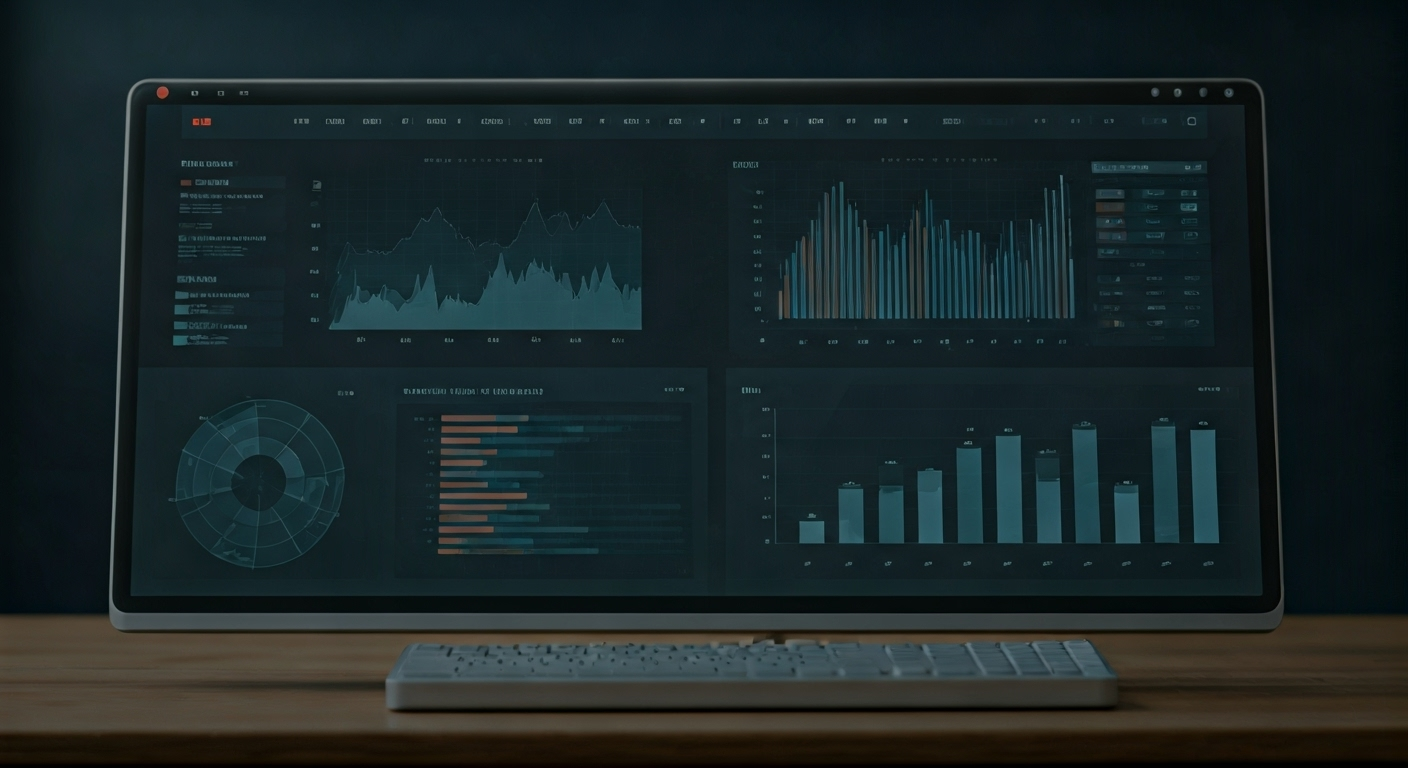August 26, 2025
15 Innovative AI Applications in Marketing Analytics 2025

Greg Kopyltsov
Founder
ai applications in marketing analytics 2025


Artificial intelligence is rapidly transforming marketing analytics, offering marketers powerful ways to analyze data, automate processes, and personalize communications. With sophisticated AI technologies, businesses can now identify trends, predict consumer behavior, and deliver targeted campaigns at scale. The integration of AI into marketing analytics brings new opportunities for efficiency and innovation while reshaping strategies in digital marketing. As you explore the following applications, you'll discover how AI is becoming indispensable for marketing professionals eager to stay ahead in a competitive landscape.

Marketing analytics is undergoing a significant transformation with the emergence of advanced AI tools and machine learning platforms. AI-driven marketing strategies are now essential for brands aiming to build stronger connections with their audiences and optimize their performance. In 2025, the landscape will be shaped by innovative use cases—from predictive analytics to generative AI-powered content creation—that streamline workflows and deliver smarter customer experiences. How will AI transform marketing analytics by 2025, focusing on specific applications and their impact? Let’s explore 15 groundbreaking applications that every marketer should know.
Predictive analytics is set to refine audience segmentation in 2025, empowering marketers to target customers with unprecedented accuracy. By using AI tools powered by machine learning, marketers can analyze vast amounts of behavioral and demographic data to map the customer journey and anticipate preferences. This approach moves beyond static demographic categories, revealing actionable insights into potential customer groups.
How can marketers leverage predictive analytics through AI to enhance campaign effectiveness in 2025? The answer lies in the ability to forecast which segments are most likely to engage with a brand, optimizing marketing efforts for maximum ROI. AI models adapt in real time, enabling marketers to respond swiftly to changing behaviors, trends, and motivations.
As algorithms become more advanced, predictive customer segmentation will enable brands to create highly tailored campaigns, increase conversion rates, and foster deeper customer loyalty. This shift ensures that every marketing strategy is supported by reliable data and smarter decision-making.
Campaign optimization in 2025 demands immediate insights, and AI now enables marketers to monitor marketing campaigns in real time. Advanced AI-driven tools process vast amounts of data from multiple channels, offering instant data analysis and actionable recommendations. Such technology helps marketing professionals detect issues and identify successful tactics as campaigns unfold.
Which AI-driven tools should marketers integrate for data analysis and campaign optimization in 2025? Platforms like Adobe Sensei, Google Marketing Platform, and Blaze are leading the way with integrated analytics and automation capabilities. Marketers are empowered to adjust campaign elements, allocate budgets efficiently, and maximize impact—all without delays.
As a result, real-time monitoring helps brands stay agile in a fast-moving market. By continuously analyzing data, marketers can make informed decisions that improve outcomes, foster innovation, and drive better results. The ability to optimize on the fly is now a critical competitive advantage.
Content creation is being revolutionized by generative AI, making automated content generation and SEO optimization core components of marketing analytics for 2025. AI-powered platforms like Jasper AI, Copilot for Microsoft, and ChatGPT allow marketers to quickly produce relevant content—from blog posts to product descriptions—tailored to specific audiences.
Which specific AI applications are revolutionizing content creation and customer engagement in marketing analytics for 2025? Generative AI enables brands to scale their content creation process, ensuring every message aligns with brand voice and search engine requirements. Marketers can effortlessly update, optimize, and personalize content for different channels and audience segments.
This shift boosts engagement and improves conversion rates while saving valuable time on repetitive tasks. By combining machine learning with creative oversight, brands can deliver authentic, high-quality content that resonates with users and supports broader digital marketing goals.
Sentiment analysis is emerging as an essential tool for brand monitoring, helping marketers interpret consumer behavior through social media and other digital channels. By leveraging natural language processing, AI technologies can assess vast amounts of unstructured data, identifying shifts in public perception and emerging trends.
How will AI shape consumer data interpretation and personalization strategies for marketing in 2025? With advanced sentiment analysis, marketers gain a deeper understanding of how customers feel about their brand, products, and messaging. This insight allows for immediate adjustments to campaigns, strengthens brand reputation, and informs targeted responses to both positive and negative feedback.
AI-driven sentiment analysis not only enhances real-time brand monitoring but also supports personalization strategies by aligning marketing messages with consumer expectations. As technology advances, brands will be able to anticipate consumer needs and deliver more meaningful experiences.
Personalization is moving to the next level in 2025, thanks to AI-powered hyper-personalization techniques. By analyzing customer experiences and behaviors, AI tools can recommend products, create custom offers, and adjust marketing efforts to fit individual customer needs.
How will AI shape consumer data interpretation and personalization strategies for marketing in 2025? Machine learning algorithms now interpret complex consumer data, enabling marketers to deliver highly relevant content and product recommendations in real time. This not only improves engagement but also drives loyalty and increases conversion rates.
With hyper-personalization, brands can ensure each interaction feels unique and meaningful. Marketers can anticipate customer needs and preferences, fine-tuning campaigns for maximum effectiveness. The result is a seamless and interactive customer journey, setting a new standard for marketing excellence.
Attribution modeling is critical to understanding which marketing efforts drive results, and AI-based models are transforming this process for 2025. By analyzing customer interactions and marketing statistics, AI tools provide a comprehensive view of digital marketing performance, highlighting where campaigns succeed and where improvement is needed.
How will AI transform marketing analytics by 2025, focusing on specific applications and their impact? AI usage enables marketers to track multi-channel touchpoints and assign value to each interaction, ensuring an accurate depiction of the customer journey. This leads to better budget allocation and improved campaign targeting.
As AI becomes more sophisticated, attribution modeling will empower businesses to make data-driven decisions, optimize marketing workflows, and maximize ROI. Advanced models not only reveal current performance but also forecast future success based on historical data.
Dynamic pricing is gaining traction as machine learning allows brands to adjust prices based on conversion rates, competitor activity, and historical data. In 2025, AI-driven pricing models ensure businesses maintain their competitive edge while maximizing revenue.
What are the main opportunities for growth by adopting AI in marketing analytics for 2025? Automated pricing tools analyze multiple variables simultaneously, enabling marketers to respond quickly to market changes and customer demand. This flexibility results in optimized pricing strategies that enhance profitability.
By leveraging dynamic pricing strategies, brands gain real-time visibility into market movements, ensuring their products are always priced to attract customers and boost sales. The adoption of machine learning in pricing delivers both strategic agility and growth opportunities.
Social media platforms are invaluable sources of consumer insights, and AI-driven social listening tools are leading trend analysis in 2025. By constantly scanning online conversations, these AI tools help marketers understand market research, consumer sentiment, and emerging marketing trends.
What are the top AI-powered marketing analytics trends to watch out for in 2025? Marketers now use platforms like Blaze and SurveyMonkey Genius to monitor social media posts, identify key influencers, and spot early signs of shifting preferences. AI enables brands to respond proactively to trends, protect reputation, and capitalize on new opportunities.
Social listening fosters agile marketing strategies, allowing marketers to adjust messaging and campaigns to stay ahead of competitors. With AI, brands can better anticipate market movements and deliver timely, relevant content to their audiences.
Intelligent chatbots and virtual assistants are transforming customer engagement and service by automating repetitive tasks and streamlining communication. In 2025, AI-powered chatbots handle inquiries, guide users through the buying process, and deliver tailored product recommendations in real time.
Which specific AI applications are revolutionizing content creation and customer engagement in marketing analytics for 2025? Tools like ChatGPT and Sephora’s AI-powered assistant provide instant solutions, personalize conversations, and gather data on user preferences. This information helps marketers refine future strategies and enhance engagement.
With intelligent chatbots, brands can maintain high-quality customer service around the clock, reducing response time and improving satisfaction. Automation frees up marketing teams to focus on strategic initiatives, making chatbots an essential part of modern marketing workflows.
Ad campaigns are becoming smarter with AI technologies that automate creative testing and content optimization. Marketing professionals in 2025 utilize AI tools to analyze performance metrics and select the most effective ad creatives to maximize results.
Which AI-driven tools should marketers integrate for data analysis and campaign optimization in 2025? Platforms like Optmyzr and Google Marketing Platform quickly evaluate different ad variations, providing actionable insights that lead to better outcomes. AI ensures that ad spend delivers the highest possible return through constant testing and refined targeting.
Automated optimization transforms traditional campaign management, reducing manual effort while improving accuracy and efficiency. Marketers can focus on strategic creativity, confident that AI will handle the data-driven aspects of ad testing.
Lead scoring, powered by deep learning, is helping marketers prioritize potential customers with greater precision. By analyzing complex behavioral patterns and engagement data, AI-driven systems accurately identify leads most likely to convert.
What are the main opportunities for growth by adopting AI in marketing analytics for 2025? Marketing automation platforms now use advanced models to update lead scores in real time, enabling sales teams to act on the hottest prospects and increase conversion rates. This results in more efficient resource allocation and higher sales performance.
With deep learning, marketers can continuously refine their targeting and nurture high-value leads, creating growth opportunities and sustainable competitive advantage in a crowded marketplace.
Visual analytics are increasingly vital, with AI-driven image recognition and video analytics offering new ways to interpret social media posts and product descriptions. In 2025, brands use these tools to identify trends, monitor user-generated content, and assess campaign effectiveness.
Which AI-driven tools should marketers integrate for data analysis and campaign optimization in 2025? Solutions like Synthesia and Google Marketing Platform analyze visual elements to provide actionable insights for digital marketing. This allows marketers to optimize content for greater engagement and relevance.
By adopting image and video recognition, businesses can harness the full potential of visual data, ensuring their messaging and branding consistently resonate with their target audience.
Natural language processing (NLP) is refining voice of customer (VoC) analytics, enabling marketers to interpret customer feedback from multiple sources, including surveys and social media. AI tools now analyze text responses to extract valuable insights for content marketing and customer service.
How will AI shape consumer data interpretation and personalization strategies for marketing in 2025? By understanding the context and sentiment behind feedback, marketers can personalize offerings and adjust strategies to better meet customer needs. NLP helps brands maintain a customer-centered approach while navigating vast amounts of data.
With advanced voice of customer analytics, companies can enhance satisfaction, improve loyalty, and create more engaging marketing processes—all while optimizing their use of AI technologies.
Forecasting ROI and budget allocation is becoming easier and more accurate with AI tools designed for marketing statistics. Platforms like SurveyMonkey Genius provide predictive insights that guide investment decisions and validate campaign success.
Can you provide key statistics on AI adoption and its impact in marketing analytics for 2025? Studies show that 56% of marketers actively implement AI, 51% use it for content optimization, and 73% deploy AI for personalized customer experiences. These numbers illustrate the growing reliance on AI for marketing analytics.
By leveraging AI for forecasting, marketers can allocate resources efficiently, maximize return on investment, and justify spending based on data-driven projections. This leads to smarter strategy development and sustainable business growth.
Fraud detection and security are becoming central concerns in marketing data management as AI usage expands. In 2025, AI technologies help brands identify unusual patterns, prevent data breaches, and enhance compliance across the marketing industry.
What challenges might brands face in implementing AI for marketing analytics in 2025, and how can they be overcome? Security threats, data bias, and lack of resources are persistent hurdles. Robust AI models can automate monitoring, flag suspicious activity, and safeguard sensitive information.
By prioritizing security, brands protect their reputation and maintain consumer trust. AI-driven fraud detection not only secures data but also enables marketers to focus on growth and innovation.

Marketers in 2025 rely on a diverse suite of AI marketing tools and platforms to streamline data analysis and campaign optimization. These new tools are transforming digital marketing by automating repetitive tasks, enhancing insights, and improving decision-making. Selecting the right platforms is crucial for ensuring seamless integration with existing marketing processes and maximizing the value of AI usage. The following sections highlight key analytics platforms and strategies for building efficient, AI-powered workflows.
Choosing robust AI marketing tools is vital for digital marketing success. Industry leaders like Adobe Sensei, Google Marketing Platform, and HubSpot offer comprehensive solutions for campaign automation, predictive modeling, and content creation. Generative AI tools such as Jasper AI and Synthesia support advanced analytics and creative workflows, while platforms like Blaze handle social media scheduling and performance tracking.
Platform Name
Key Functionality
Use Case
AI Technology Type
Strengths
Adobe Sensei
Data analysis, automation
Campaign management
Machine learning
Integrated analytics, automation
Google Marketing Platform
Predictive modeling, ad optimization
Digital advertising
Generative AI, ML
Real-time optimization
HubSpot
Social media, personalized content
Lead generation
AI-powered automation
Customization, reporting
Jasper AI
Content creation, data analysis
SEO, blog posts
Generative AI
Fast, scalable content generation
Synthesia
Video creation, campaign personalization
Training, visual analytics
Generative AI
Immersive experience
Blaze
Social media scheduling, performance tracking
Social listening
Automation
Calendar management, engagement
Marketers should assess their goals, team skills, and integration needs when selecting AI platforms to ensure they achieve efficiency and growth in marketing analytics.
Integrating AI technologies into marketing processes requires a clear strategy and a focus on seamless workflows. Marketers must ensure new AI tools complement existing platforms while automating repetitive tasks and improving campaign outcomes. Effective integration supports marketing automation and maximizes AI usage across channels.
With an actionable plan, marketers can unlock the full potential of AI tools and drive consistent results across all aspects of digital marketing.

Emerging AI marketing trends are reshaping digital marketing strategies, presenting marketers with exciting growth opportunities and a competitive edge. By embracing innovations in predictive analytics, personalization, and automation, professionals can optimize their marketing efforts and build lasting customer relationships. Staying ahead of key trends ensures brands remain relevant and capitalize on the latest advancements in marketing analytics. The following sections outline the most impactful AI-driven trends and new opportunities for leveraging analytics in 2025.
The landscape of AI marketing trends features rapid advancements in search engine optimization, content creation, and campaign management. Marketers in 2025 benefit from:
What are the top AI-powered marketing analytics trends to watch out for in 2025? These trends support marketers in delivering more targeted, personalized experiences, increasing conversion rates, and maintaining a competitive edge in their industry.
AI adoption in marketing analytics unlocks significant growth opportunities for businesses willing to innovate. Predictive analytics provides marketers with the ability to anticipate customer needs, fine-tune strategies, and drive engagement. By leveraging automated marketing efforts, brands can increase efficiency, reduce costs, and boost return on investment.
Marketing professionals who master AI technologies gain a competitive advantage, delivering campaigns that resonate with their audiences and adapt to shifting trends. Continuous learning and experimentation with new AI tools are essential for maintaining relevance and achieving long-term success.
As organizations embrace advanced analytics and data-driven decision-making, opportunities for growth expand—enabling smarter targeting, improved conversion rates, and better customer experiences for all.

Marketers must navigate critical challenges and ethical considerations as AI technologies become more prevalent in analytics. Data privacy and bias in AI are central issues that demand attention and responsible action. Marketing teams must stay informed about regulatory requirements, implement transparent practices, and actively address potential risks. Overcoming hurdles in AI implementation requires targeted training, clear policies, and a commitment to ethical standards. The upcoming sections offer actionable solutions for data privacy and practical tips for overcoming common obstacles.
Data privacy is a leading concern for marketers using AI, as vast amounts of consumer information are processed for personalization and campaign optimization. To address privacy risks, ethical considerations must be integrated into every AI-driven marketing strategy. Marketers should comply with regulations such as GDPR and adopt transparent data practices to protect consumer rights.
Bias in AI is another challenge, resulting from training algorithms with unrepresentative or skewed data sets. Unchecked, these biases can perpetuate discrimination and erode trust in both the marketing industry and individual brands. Regular system audits and diverse data sources are necessary to minimize bias and uphold fairness.
By prioritizing ethical standards and responsible AI usage, marketers can build trust with their audiences and create data-driven campaigns that respect privacy and eliminate unfair bias.
Adopting AI technologies in marketing workflows presents several common hurdles, including lack of expertise, resource constraints, and resistance to change. By implementing targeted solutions, marketing teams can overcome these barriers and harness the full potential of AI.
What challenges might brands face in implementing AI for marketing analytics in 2025, and how can they be overcome? These practical steps enable brands to future-proof their strategies and drive sustainable growth in a rapidly evolving market.
KeywordSearch has an AI Audience builder that helps you create the best ad audiences for YouTube & Google ads in seconds. In a just a few clicks, our AI algorithm analyzes your business, audience data, uncovers hidden patterns, and identifies the most relevant and high-performing audiences for your Google & YouTube Ad campaigns.
You can also use KeywordSearch to Discover the Best Keywords to rank your YouTube Videos, Websites with SEO & Even Discover Keywords for Google & YouTube Ads.
If you’re looking to SuperCharge Your Ad Audiences with AI - Sign up for KeywordSearch.com for a 5 Day Free Trial Today!
As we look toward the future of marketing analytics, the integration of AI applications will undeniably transform how businesses engage with customers and analyze performance. From predictive customer segmentation to intelligent chatbots for enhanced engagement, these innovations provide marketers with powerful tools to optimize strategies and drive results. Embracing AI not only facilitates deeper insights but also opens the door to hyper-personalized experiences that resonate with consumers. By staying informed about these trends, organizations can harness the full potential of AI, ensuring they remain competitive in an ever-evolving landscape. Ready to explore how AI can elevate your marketing efforts? Get a free consultation with our experts today!
AI technologies will reshape marketing strategy by enabling predictive analytics, real-time personalization, and rapid decision-making. Marketers will leverage data-driven insights to customize campaigns, optimize resource allocation, and respond instantly to customer behaviors, making marketing more agile, targeted, and effective.
The main challenges include safeguarding data privacy, managing vast amounts of data, mitigating bias in AI models, and addressing the need for rapid implementation with limited resources. Teams must invest in training and transparent practices to overcome these hurdles and maximize AI’s benefits.
Industries such as digital marketing, customer service, social media, content marketing, and any sector relying heavily on marketing campaigns see the greatest benefits from AI-driven analytics. These tools enhance targeting, streamline workflows, and improve customer engagement across diverse markets.